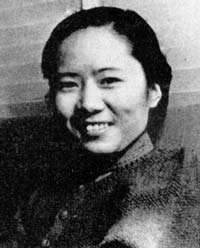
| Born: May 31, 1912 in Liu Ho, Shanghai, China |
| Died: Feb 16, 1997 (at age 84) in New York City, United States |
| Nationality: Chinese, American |
| Field: Physics |
| Famous For: The Manhattan Project, Beta decay research, parity violation experiments |
| Awards: Wolf Prize (1978), National Medal of Science (1975), Bonner Prize (1975), Comstock Prize in Physics (1964) |
Chien-Shiung Wu was a Chinese-American physicist with great expertise in the techniques of radioactivity and experimental physics.
Early Life
Wu was born on May 31st, 1912 in Liu ho, China. She was raised in a small town called Liuhe in Taicang, about 40 miles from Shanghai. Her father was a proponent of gender equality and he later founded the Mingde Women’s Vocational Continuing School. At the age of 11, Wu left her hometown to go to Sozhou Women’s Normal School.
In 1926, Wu joined the National Central University in mainland china. In the same year she went to teach in the Public School of China. Between 1930 and 1940, Wu studied in the physics department of National Central University. After her graduation she worked as an assistant at Zhejiang University. She later became a researcher at the Institute of Physics of Academia Sinica.
Life in the U.S.
Chien-Shiung Wu always wanted to further her studies in physics. She therefore started applying to study at overseas universities. In 1936 she traveled to the United States. Wu joined graduate school at the University of California. She managed to get a position as a graduate student under the supervision of Ernest O. Lawrence who was the world’s leading Physics and the Nobel Prize for Physics winner in 1939. Wu completed her PhD in 1940.
Scientific Career
Wu joined the Manhattan project early in WWII. Here she helped develop the process to enrich uranium ore to produce the fuel for the atomic bomb. In 1944 she accepted a position at Columbia University where she did some research. Her research at the university helped to disprove the law of conservation of parity. This law has been assumed to be a fundamental law of nature. It stated that beta particles emitted by a radioactive nucleus would fly off in any given direction, regardless of the spin of nucleus.
In 1957, utilizing atoms of cobalt-60, Wu showed that beta particles were most likely to be emitted in a particular direction. This direction depended on the spin of the cobalt nuclei. This confirmed a 1956 theory by other scientists who received the 1957 Nobel Prize in physics.
Wu also conducted research on molecular changes in the deformation of hemoglobin that lead to sickle-cell anemia.
Honors
Chienh-Shiung Wu received numerous awards. She was the first woman to be elected president of the American Physical Society and to receive the Cyrus B. Comstock Award of the National Medal of Sciences. She also received the National Medal of Science in the year 1975 and the John Price Wetherill Medal at the Franklin Institute in 1962. Wu was the first recipient of the Wolf Prize in Physics in 1978.
Death
Wu died on February 16th, 1997 at the age 84. The cause of her death was a stroke.